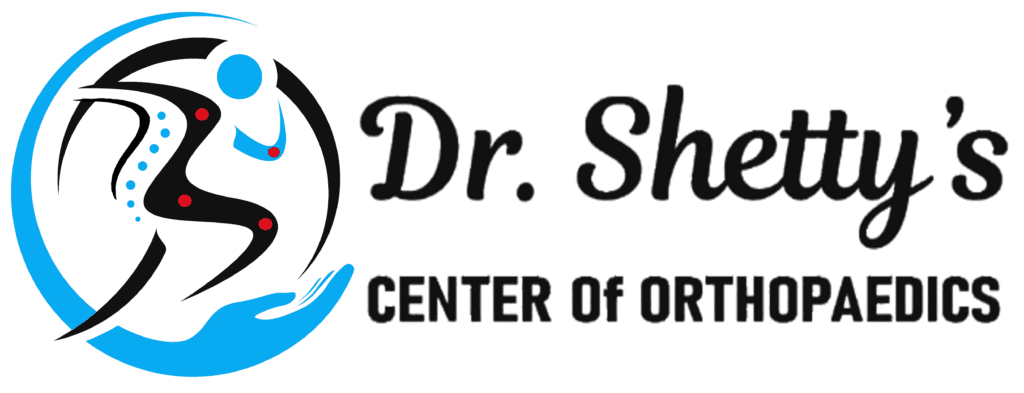Dr. Akshay Shetty Orthopaedics
Osteoporosis
Osteoporosis
Osteoporosis is a bone disease that develops when there is a substantial drop in the bone mineral density and bone mass decreases, resulting in the change of structure and strength of bone. This can lead to increased risk of fractures (broken bones).
Osteoporosis is a “silent” disease because you typically do not have symptoms, and you may not even know you have the disease until you break a bone. Osteoporosis is the major cause of fractures in postmenopausal women and in older men. Fractures can occur in any bone but happen most often in bones of the hip, vertebrae in the spine, and wrist.

Risk factors:
A number of factors can increase the likelihood that you’ll develop osteoporosis — including your age, race, lifestyle choices and medical conditions.
Non- modifiable risks (which are not in our control) include:
• Gender. Women are much more likely to develop osteoporosis than are men.
• Age. The risk of osteoporosis, .increases with age.
• Race. White or Asian descent, have shown higher risk of osteoporosis
• Family history. A family history of osteoporosis adds to a higher risk, especially if your mother or father fractured a hip.
• Body frame size. Men and women who have small body frames tend to have a higher risk owing to less bone mass to draw from as they age.
Hormone levels:
Osteoporosis is more common in people who have too much or too little of certain hormones in their bodies. Examples include:
• Sex hormones: Lowered levels of sex hormone lead to weaken bone. The fall in estrogen levels in women at menopause is one of the major risk factors for developing osteoporosis. Treatments for prostate cancer that reduce testosterone levels in men and treatments for breast cancer that reduce estrogen levels in women are likely to accelerate bone loss.
• Thyroid problems: Too much thyroid hormone can cause bone loss. This can occur if your thyroid is overactive or if you take too much of thyroid hormone medicine to treat an underactive thyroid.
• Other glands: Osteoporosis has also been associated with an overactive parathyroid and adrenal glands.
Dietary factors:
Osteoporosis is more likely to occur in people who have:
• Low calcium intake: A lifelong lack of calcium is pivotal in the development of osteoporosis. As low calcium intake contributes to diminished bone density, early bone loss and thus increases the risk of fractures.
• Eating disorders: Severely restricting food intake and being underweight weakens bone in both men and women.
• Gastrointestinal surgery: Surgery to reduce the size of your stomach or to remove part of the intestine limits the amount of surface area available to absorb nutrients, including calcium. These surgeries include those to help you lose weight and for other gastrointestinal disorders.
Steroids and other medicines:
Long-term use of oral or injected corticosteroid medicines interfere with the bone-rebuilding process.
Osteoporosis has also been associated with medications used to combat or prevent:
• Seizures.
• Gastric reflux.
• Cancer.
• Transplant rejection.
Medical problems:
The risk of osteoporosis is higher in people who have certain medical problems, including:
• Celiac disease.
• Inflammatory bowel disease.
• Kidney or liver disease.
• Cancer.
• Multiple myeloma.
• Rheumatoid arthritis.
Lifestyle choices
Some bad habits can increase your risk of osteoporosis. Examples include:
• Sedentary lifestyle: People who spend a lot of time sitting have a higher risk of osteoporosis than do those who are more active.
• Excessive alcohol consumption: Regular consumption of more than two alcoholic drinks a day increases the risk of osteoporosis.
• Tobacco use.:Use of tobacco products have shown to be contributing factors to weak bones.
Management-
The most important aim of treating osteoporosis is preventing bone fractures. Effective bone fracture treatment in HSR Layout, BTM, Koramangala includes:
Exercise: Regular exercise can strengthen your bones (and all the tissue connected to them, like your muscles, tendons and ligaments)
Lifestyle modifications
Vitamin and mineral supplements: You might need over-the-counter or prescription calcium or vitamin D supplements.
Medications- Bisphosphonates & Teriparatide ( slow continuous dosage of synthetic PTH) play a major role in the management of osteoporosis.
Harmone Replacement Therapy (HRT) in post menopausal females has got a special importance in treatment Osteoporosis in this patients sub group.
For comprehensive osteoporosis treatment and bone fracture treatment in HSR Layout, BTM, and Koramangala, consult with our doctor Dr Akshay Shetty is the Best orthopedics specialist in HSR Layout in these areas to get the best care and treatment plans.
